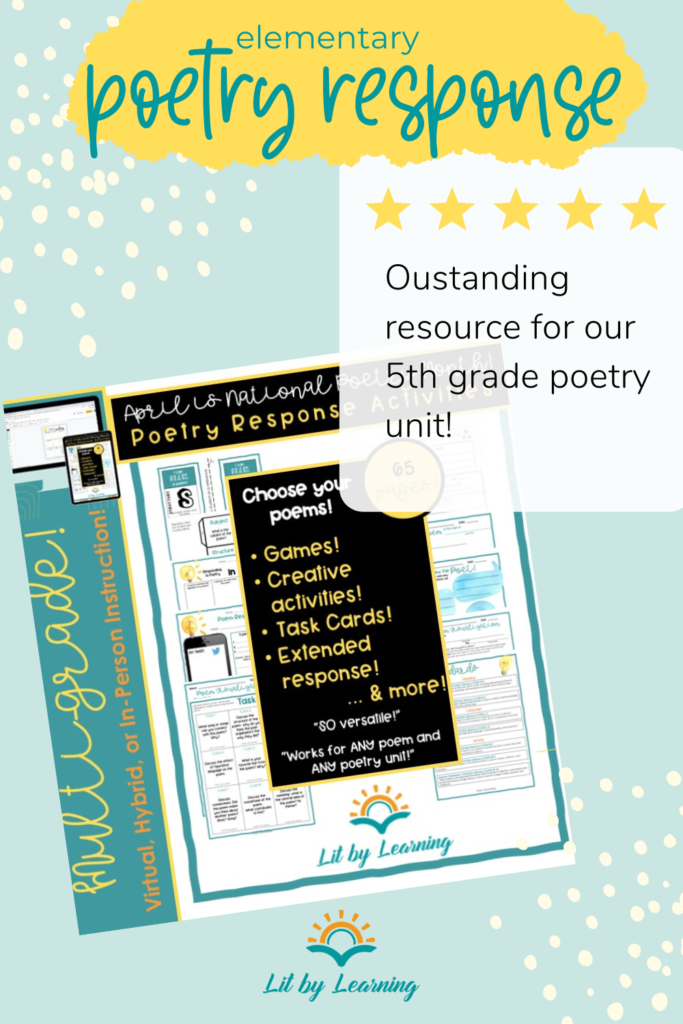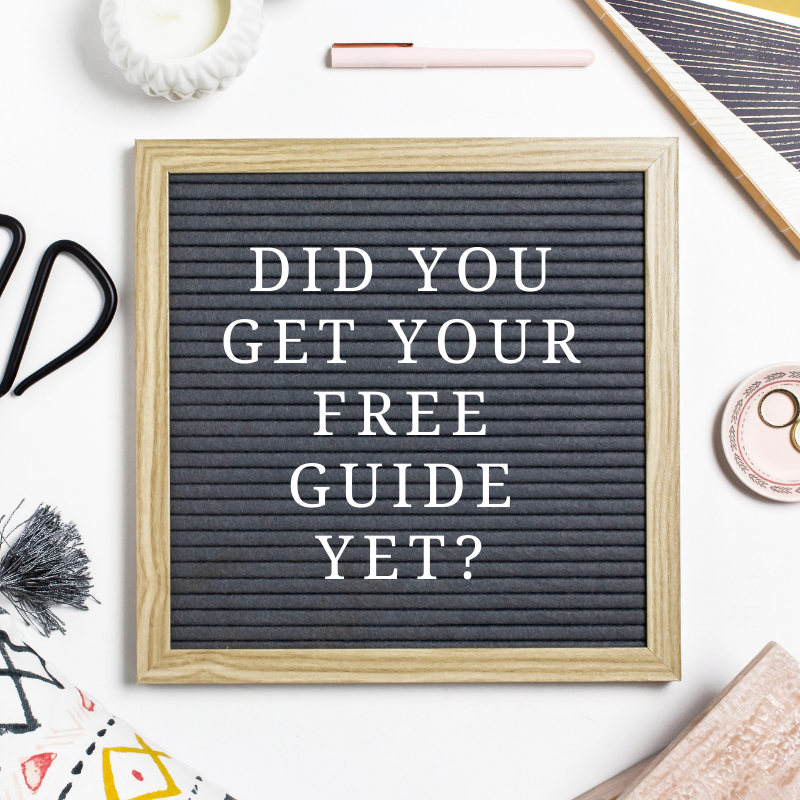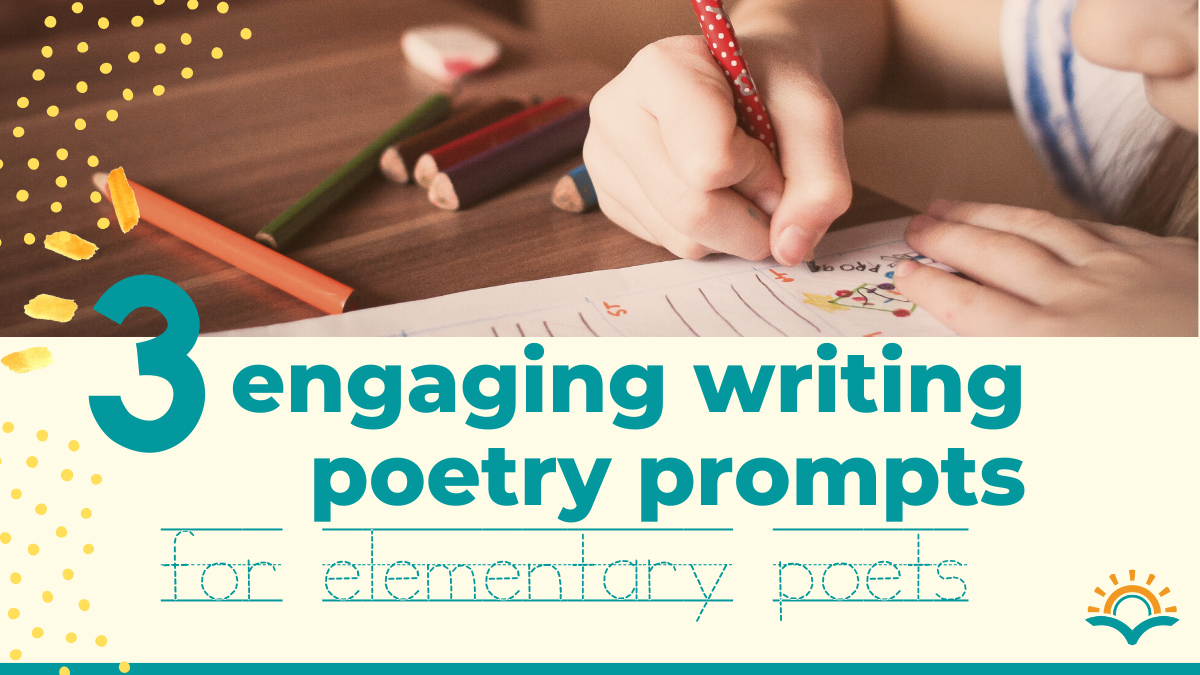
Elementary teachers: Are your students looking for some inspiration on how to write poetry? Need ideas for poetry activities for National Poetry Month? Read on for my 3 all-time favorite poetry prompts – ready for National Poetry month April and beyond!
Pssttt… this is for dedicated teachers like you!

What is poetry?
I used to think that poetry was just cute rhymes, identifying figurative language, and counting syllables. I hated it. I hated reading it, I hated learning about it, and I hated the idea of teaching it. I knew there had to be something I was missing, so I dug deeper. It was reading illustrated children’s poetry books that centered big ideas that helped me refresh my view. These beautiful texts changed me to a poetry… LOVER. So what do I mean poetry now?
My new personal definition of poetry is “art with words.” Poetry to me includes song lyrics, word art, clever wordplay and invoking strong emotions through poets’ tools. In my classroom, we talk a lot about “experimenting” and “playing” with words that delight us. If this doesn’t match your definition of poetry, these writing poetry prompts probably won’t resonate with you – and that’s OK!
Why writing poetry prompts?
With the right instruction, elementary students are so excited about writing poetry, but that doesn’t mean it comes easy. Young poets, like all of us, get stuck. You’ve seen it in your classroom before:
- Students copying mentor poems word for word
- Students “frozen” without a word on their paper
- Students getting frustrated by their lack of ideas
- Students comparing their poems to others’ and feeling deflated.
Writing poetry prompts gives your students permission to use mentor ideas. It allows them to borrow inspiration from a beloved text, but then adapt it to make it their own. In short, it takes some of the cognitive load of writing poetry away. This gets students’ pencils moving and BAM! they’re building up momentum and confidence. Soon, you won’t be able to get them to stop writing poetry!
Why these writing poetry prompts?
These prompts start with a subject all students know best: themselves. Beginning with writing about their own identities is wonderful because it has a low floor and a high ceiling. Writing poetry about oneself is at once incredibly accessible AND has the potential to go very deep. It’s a beautiful place to start with elementary poets!
I also chose these prompts because they have fabulous mentor texts: lyrical book-length prose as well as shorter poems. These are great to get students’ minds going!
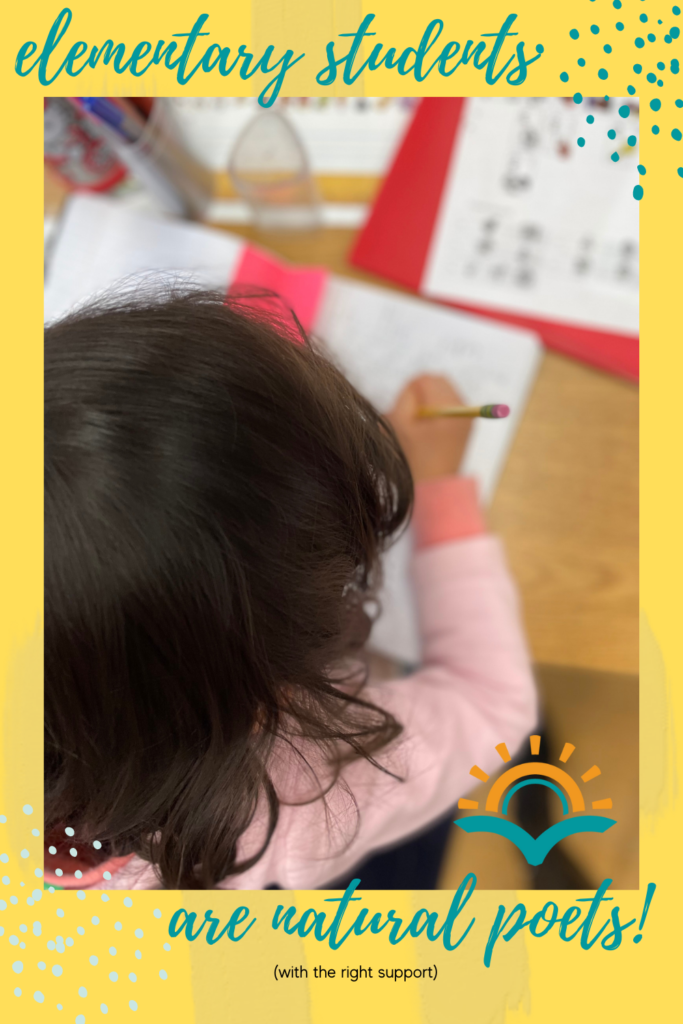
How to use these writing poetry prompts with your students
I use a simple 5-step instruction workshop-style outline for each of these writing prompts:
- Read the mentor text: Soak it in, just enjoy it.
- Re-read the mentor text: This time, focus on how the poet/author finished the writing prompt themselves. Explore any poets’ tools they used: figurative language, appealing to senses, allusion, etc.
- Frame the writing activity: Depending on my group and their writing levels, I usually frame their writing job as either a one-pager or rough draft to be built upon later. One pagers focus on using the prompt only once & allow students to really focus on the imagery and illustrations right away. Rough drafts prompt the students to use the prompt several times in a brainstorm, “as many as you can” fashion. They then revisit and expand upon it later.
- Write!: Students work on their own on their writing task! I like to play some soft music and encourage students to use their whisper voices.
- Share!: Students share out what they created in their writing time! They get time to see others’ writing and share out their hard work.
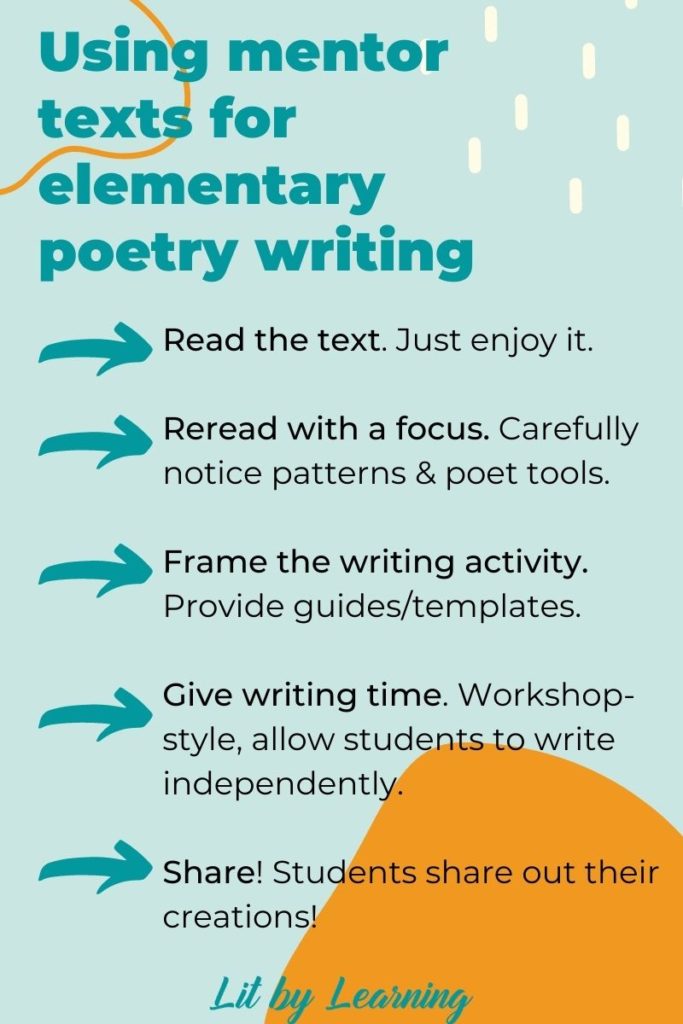
Writing Poetry prompt #1: I feel…
This first writing poetry prompt prompts elementary students to tune in with their feelings and begin to think figuratively – both needed for poetry! It also has many great potential mentor texts. I chose my three favorites. First, The Way I Feel by Janan Cain is a simple starter. It names and describes different emotions while illustrating them in a way that students love. For a similarly whimsical mentor text, check out the Jamie Lee Curtis classic: Today I Feel Silly (and other moods that make my day).
Encourage students to dive deeper with feeling through the third mentor text: Visiting Feelings. Friends, I was about a week-ago years old when I discovered this gem and my mind is bursting with the socio-emotional x poetry ideas! This book personifies feelings as “visitors” in a way that is both delightful and empowering.
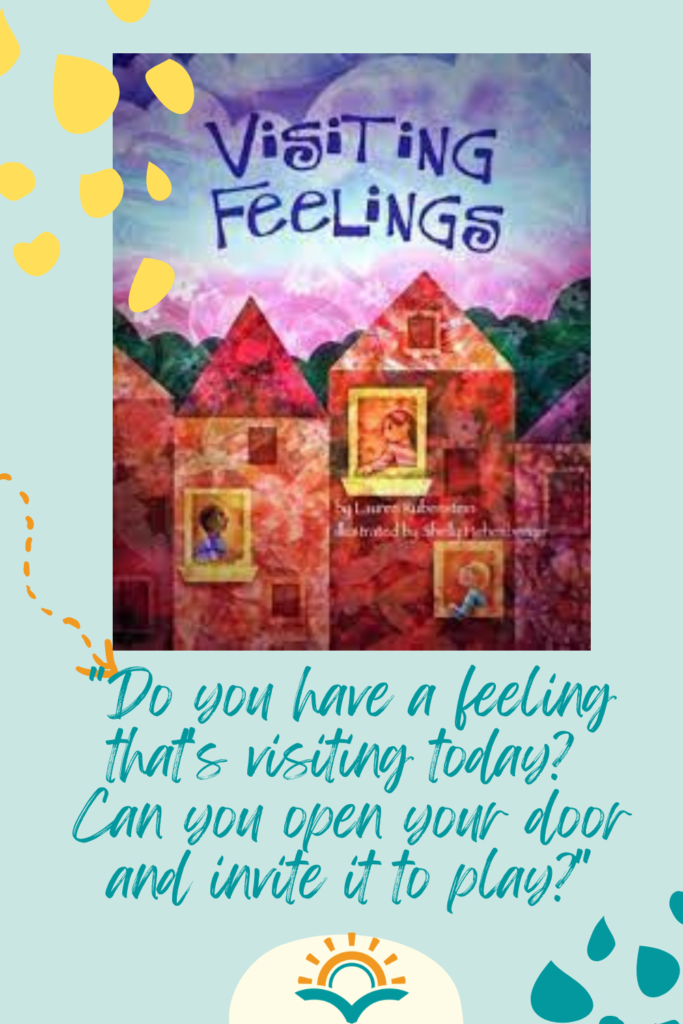
Writing poetry prompt #2: I am…
Super simple, right? For this prompt, I love to use I Am Every Good Thing by Derrick Barnes as our main mentor text. This poetic book features an African American boy who uses similes, metaphors, and allusions to describe who he is. It’s a powerful, joyful text of self-love that students will love immediately. Another beautiful book to model this writing poetry prompt is The Me I Choose to Be by Natasha Anastasia Tarpley with art by Regis and Kahran Bethcourt. A third, slightly sillier, poem that works to model this is “Daydreaming” by Lisette Norman, published in My Feet are Laughing:
I’m the last cookie in a jar
I’m a hip-hop song that makes ou wiffle
I’m a late-night sneaky giggle
I’m a cornrow braid
I’m a cool glass of lemonade.
excerpt of “Daydreaming” by Listette Norman, Published in “My Feet are Laughing”
After we’ve finished our reading of the mentor texts, we collectively brainstorm ways that WE could finish the “I am…” prompt. Depending on the writing levels of the students, I like to keep this list in a central place so students can refer to it while writing!
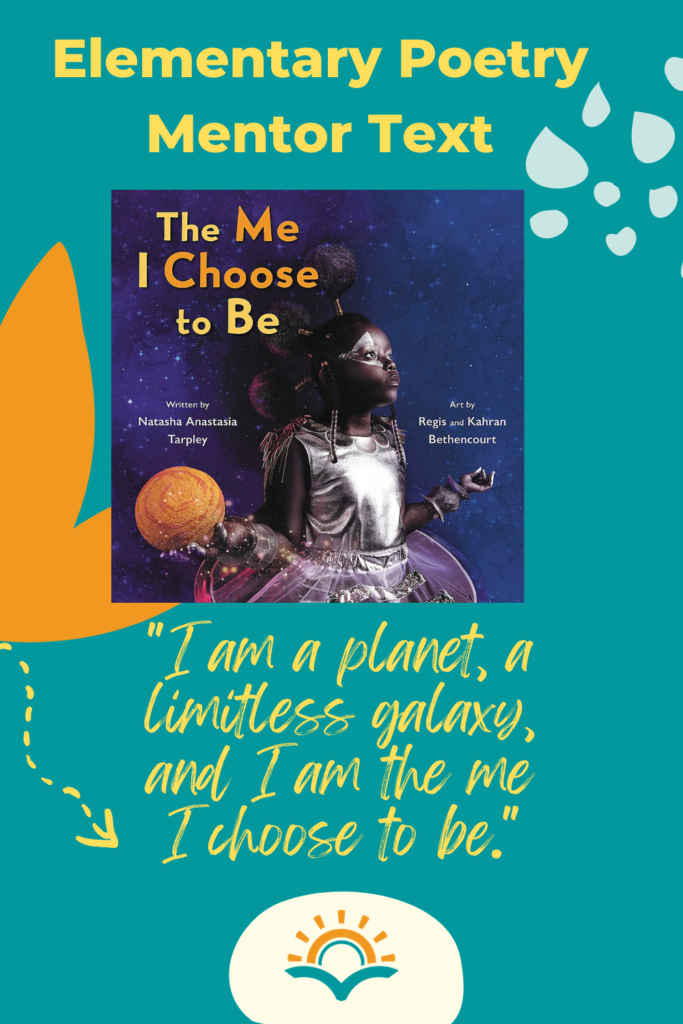
Writing poetry prompt #3: I am from…
For this prompt, I love to use the lyrical picture book, Where Are You From? by Yamille Saied Mendez. In this beautiful book, a young girl parrots the questions she’s been asked at school, “Where are you from?” The grandfather’s answers are touching and range from literal to figurative. They demonstrate both the complexity and simplicity of this question.
“You’re from hurricanes and dark storms, and a tiny singing frog that calls the island people home when the sun goes to sleep….“
Where are you From? (Yamille Saied Mendez)
For upper elementary students, you can also model this poem using the classic “I am” poem by George Ella Lyon. I’ve included the video version of it below!
Once again, prompt students to think about how the author/poet finished the prompt, “I am from.” Guide them to notice both the literal and non-literal answers. Question them, “What imagery does this bring to your mind? What is the poet telling us about themselves through this line?”
From there, ask students to create their own ways to finish the “I am from…” prompt. I can guarantee you’ll have some amazing poems!

Looking for more poetry resources?
Make sure to check out my other blog posts about poetry – there’s something for everyone! I also have several elementary poetry resources available on my Teachers Pay Teachers Store – I’d love to support you however I can!
